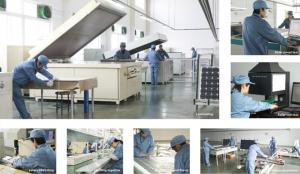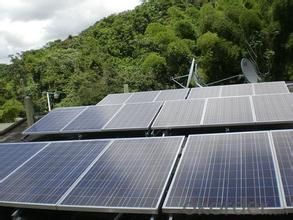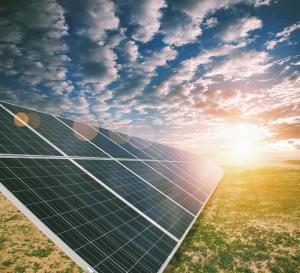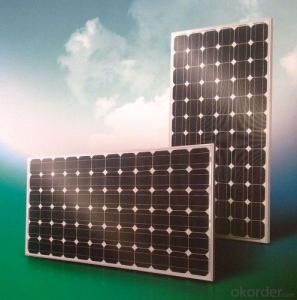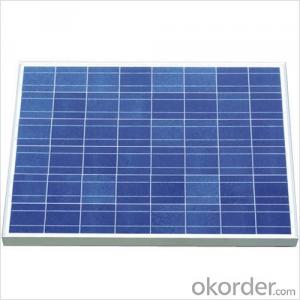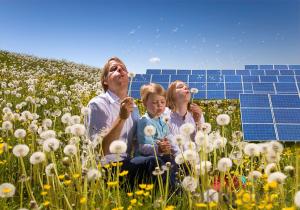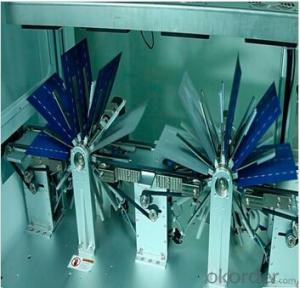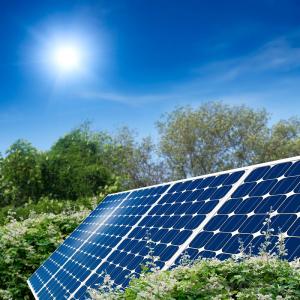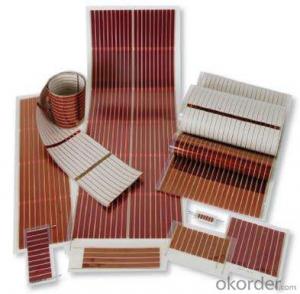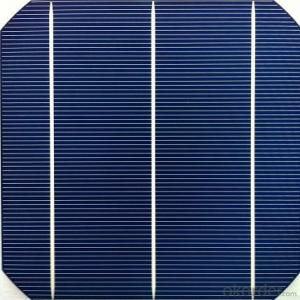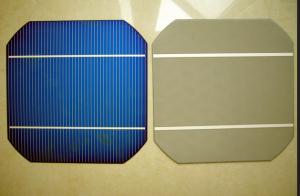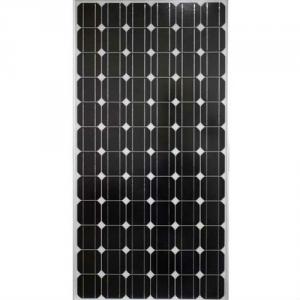1.5 V Solar Cells Monocrystalline Silicon Solar Panel for 310W
- Loading Port:
- Shanghai
- Payment Terms:
- TT or LC
- Min Order Qty:
- 100 watt
- Supply Capability:
- 1000000 watt/month
OKorder Service Pledge
OKorder Financial Service
You Might Also Like
Monocrystalline Solar Module for 250W Series Description:
Monocrystalline Solar Module for M125-15W l : High efficiency crystalline solar cell. Even if under the weak light, the solar module can produce maximum power output.
II Tempered glass (toughened glass): Anti-reflecting coating and high transmission rate glass increase the power output and mechanical strength of solar module.
III EVA and TPT: Using high quality EVA and TPT to prevent destroying and water.
IV AI frame: Without screw, rner connection. 6 holes on the frame can be installed easily.
V Junction box: Multi function junction box with water proof.
VI Long lifetime: ≥25 years; Less power decrease.
VII Good performance of preventing from atrocious weather such as wind and hails.
VIII Resisting moisture and etching effectively, not effected by geology.
IX The certificate issued by international authority: UL, TUV, IEC, CE.
2. Standard Test Conditions of Monocrystalline Silicon Solar Panel:
The opto-electrical specifications shown below are stabilized values being measured at Standard Test Conditions, Irradiance: 1000W/m2, Spectrum: AM1.5 at 25°C, The info below is subject to manufacturing tolerances. Where appropriate minutes of measurement are available and are used for the dimensioning of the installation.
Advantages of Monocrystalline Silicon Solar Panel
• CNBM Solar performance guarantees for 25 years
• 12 years guarantee for workmanship
• Timeliness of delivery
• Quality Products certified (TÜV, UL, CE, ISO)
3. Solar Panel Images
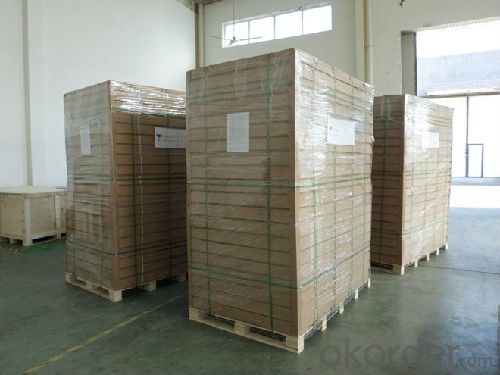
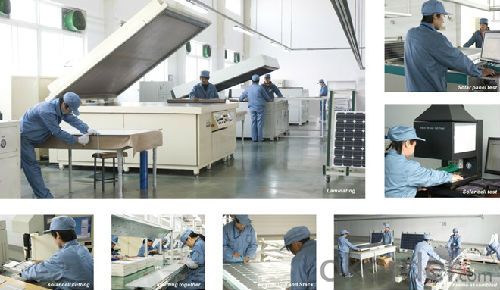
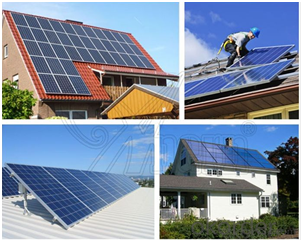
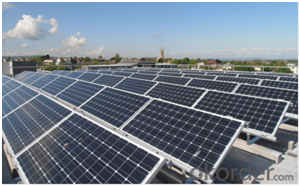
How about your company?
CNBM Solar photovoltaic (PV) Panel has various wattage from 1.5W to 315W to meet the demand of every customer. It is the optimal choice for both on-grid and off-grid power systems. CNBM Solar panel offers high performance of power warranty and good after sale service, we have professional people to reply your problem anytime.
CNBM International Corporation's products including Monocrystalline Solar Panel, Polycrystalline Solar Panel have received and enjoyed famous reputation in many countries and regions in the world .As a solar panel supplier in China, we strive to provide our customers with excellent service, superior products and unmatched value.
How to guarantee the quality of the products?
CNBM Solar performance guarantees for 25 years
• 12 years guarantee for workmanship
• Timeliness of delivery
• Quality Products certified (TÜV, UL, CE, ISO)
How long can we receive the product after purchase?
In the purchase of product within three working days, We will arrange the factory delivery as soon as possible. The pecific time of receiving is related to the state and position of customers.Commonly 7 to 10 working days can be served.
- Q: Can solar cells be used in greenhouses or agricultural facilities?
- Yes, solar cells can be used in greenhouses or agricultural facilities. By harnessing the power of the sun, solar cells can generate electricity to power various operations within these facilities, such as lighting, heating, ventilation, and irrigation systems. Additionally, solar cells can help reduce energy costs and carbon emissions, making them a sustainable and eco-friendly choice for agricultural practices.
- Q: Can solar cells be used on vehicles?
- Yes, solar cells can be used on vehicles. They can be integrated into the design of cars, buses, boats, and even planes to harness solar energy and provide power for various vehicle functions such as charging batteries, running electrical systems, or even powering the entire vehicle. This helps reduce reliance on fossil fuels, lowers emissions, and promotes sustainable transportation.
- Q: Can solar cells be used for off-grid power supply?
- Yes, solar cells can be used for off-grid power supply. Solar cells, also known as photovoltaic cells, convert sunlight into electricity. These cells can be used to generate electricity in remote areas or locations where the traditional power grid is unavailable or unreliable. Solar panels can be installed on rooftops or in open spaces to capture sunlight and produce electricity, which can then be stored in batteries for use during non-sunlight hours or when needed. This makes solar cells an efficient and sustainable solution for off-grid power supply.
- Q: Are there any subsidies or incentives for installing solar cells?
- Yes, there are various subsidies and incentives available for installing solar cells. These can include federal tax credits, state and local incentives, grants, and rebates. These measures aim to promote the adoption of solar energy and make it more affordable for individuals and businesses to invest in solar panel installations.
- Q: What is the maximum voltage output of a solar cell?
- The maximum voltage output of a solar cell can vary depending on various factors such as the type and design of the solar cell, as well as the intensity of sunlight. However, for a typical silicon solar cell, the maximum voltage output is usually around 0.5 to 0.6 volts.
- Q: Can solar cells be used to power irrigation systems?
- Yes, solar cells can be used to power irrigation systems. Solar cells convert sunlight into electricity, which can be stored in batteries and used to power irrigation systems. This provides a sustainable and renewable energy source for agriculture and reduces dependency on traditional power grids.
- Q: What is the impact of temperature fluctuations on solar cell efficiency?
- Temperature fluctuations can have a significant impact on solar cell efficiency. Generally, as temperatures rise, the efficiency of solar cells decreases. This is because higher temperatures can increase the resistance of the materials used in the solar cell, resulting in a decrease in the conversion of sunlight into electricity. Additionally, excessive heat can cause thermal stress and degradation of the solar cell's components, further reducing its efficiency over time. Therefore, temperature regulation and cooling mechanisms are crucial in maintaining optimal solar cell performance and maximizing energy production.
- Q: How can solar cells be used in residential applications?
- Solar cells can be used in residential applications by installing solar panels on rooftops or other open areas to capture sunlight and convert it into electricity. This clean and renewable energy source can power various appliances and lighting systems within a home, reducing reliance on traditional grid electricity and lowering utility bills. Additionally, excess energy generated by solar cells can be stored in batteries or fed back into the grid, further promoting sustainability and potentially earning homeowners credits or incentives.
- Q: Can solar cells be used in desalination plants?
- Yes, solar cells can be used in desalination plants. Solar energy can be harnessed to power the desalination process, providing a sustainable and environmentally friendly solution to address the growing global water scarcity issue.
- Q: I am a purchasing manager for a EPC engineering company, and we are planning to purchasing some 4bb solar cells for one of our project in Taiwan, can I get a quotation online?
- I did the purchasing for my client once, and I found out you can get to talk to many sellers if you spend some time searching on alibaba.
Send your message to us
1.5 V Solar Cells Monocrystalline Silicon Solar Panel for 310W
- Loading Port:
- Shanghai
- Payment Terms:
- TT or LC
- Min Order Qty:
- 100 watt
- Supply Capability:
- 1000000 watt/month
OKorder Service Pledge
OKorder Financial Service
Similar products
Hot products
Hot Searches
Related keywords
